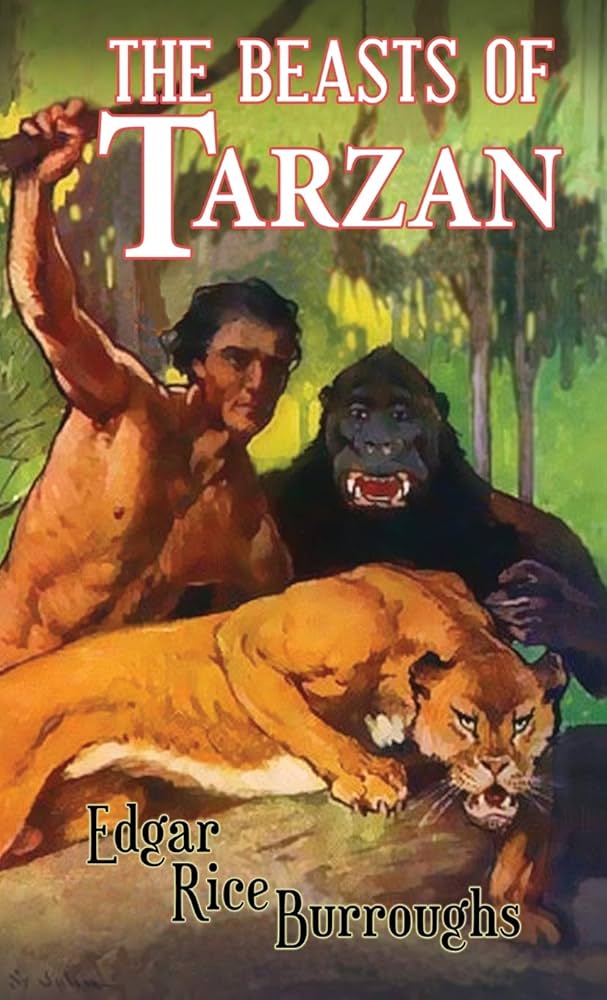Chapter 15 — The beasts of Tarzan
byChapter 15 — The beasts of Tarzan pushes the narrative into deeper tension as Tarzan forges ahead along the wild Ugambi River, chasing the faint trail of his kidnapped wife, Jane. He interprets the subtle signs left in the mud and along the foliage, each mark suggesting that she was close but under growing danger. With animal instinct sharpening his focus, Tarzan realizes that Jane is no longer alone; Rokoff is close, possibly gaining on her. Panic does not overcome him—purpose does. Spotting a small canoe in the distance, his heart lurches as he identifies the figure of Rokoff paddling hastily. With a roar that startles birds from the treetops, Tarzan charges, his feet splashing into the river, calling Mugambi to his side, the beasts surging with them like a living tidal wave.
The chase becomes a blur of motion. Tarzan, powered by rage and desperation, cuts through the water with alarming speed. Rokoff, thrown into panic, attempts to increase distance but is gripped by dread at the sight of his pursuer. Just when Tarzan closes in, a sudden attack by a lurking river predator pulls him under, and silence falls. Rokoff, shaken and splattered with water, assumes his enemy is defeated. But the jungle teaches that nothing stays buried for long. He flees downriver, thinking only of escape, never knowing how close death came. The fear drains him more than the heat or the weight of his stolen freedom. The jungle, however, is never merciful to the guilty.
While Rokoff vanishes into the depths of the jungle, tormented by paranoia and exhaustion, Jane continues her lonely passage down the Ugambi. She rows cautiously, pausing only to rest in hidden patches along the shore, her eyes always alert. The river is both her path and her cage—keeping her moving but not offering safety. Still, she rows with resolve. Each stroke brings her closer to either salvation or peril. Her hope rests in reaching some vessel, some signal that civilization has not fully abandoned her. Eventually, after days of this exhausting navigation, she spots a faint silhouette of a ship—anchored and still.
Jane approaches the vessel, heart pounding, unsure whether danger or rescue awaits. She finds it deserted except for a few drunken sailors who pose no immediate threat. With quick thinking, she locks them in and takes temporary command of the vessel. There’s no time for celebration. Her survival now depends on her ability to stay alert. Every sound from the jungle, every ripple on the water, could bring allies or enemies. Still, Jane prepares for the worst, barricading herself as best she can. Her will to fight burns as strong as her longing to reunite with Tarzan.
Back in the forest, Mugambi waits anxiously for signs of Tarzan, unsure if the jungle has claimed him or if he stalks silently toward vengeance. The animals, restless but loyal, sense their leader’s absence. Yet none dare abandon the pursuit. The wild respects power—and Tarzan’s return would only be a matter of time. Meanwhile, Rokoff stumbles through unfamiliar terrain, tormented not only by the landscape but by the certainty that Tarzan is not dead. His steps are clumsy, his thoughts fragmented. Every rustling branch becomes a threat, every shadow a predator. His control is unraveling.
This chapter underscores the raw perseverance that defines its characters. Tarzan, even submerged by nature’s threats, refuses to surrender. Jane, surrounded by danger, still seizes moments of courage to stand her ground. Rokoff, in contrast, illustrates how fear can destroy a man faster than any beast. The narrative pulses with urgency, pulling readers deeper into a story where love fuels endurance, and revenge lurks behind every tree. As the river narrows, the paths of these characters are set to collide again—with fate and fury leading the way.

